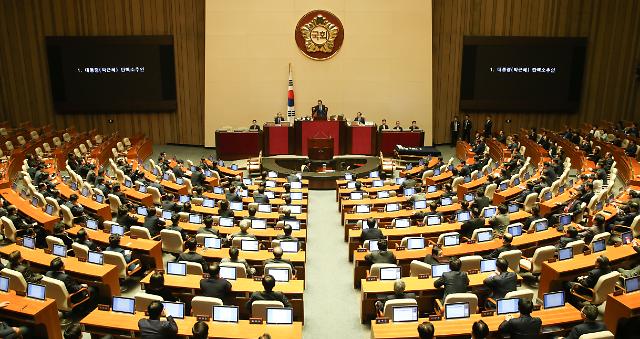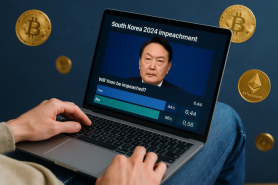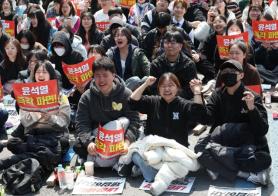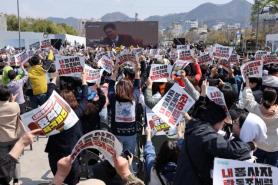
South Korea's parliament speaker announces the results of an impeachment vote. [Joint Press Corps]
The leadership vacuum created by the impeachment of President Park Geun-hye is expected to darken the already bleak diplomatic landscape for South Korea, making it tougher to get over growing challenges it faces with major partner countries and allies through the so-called summit diplomacy, experts said Friday.
Earlier, the 300-seat National Assembly voted to oust the president for her alleged involvement in the corruption and influence-peddling scandal. With the lawmakers approval, the Constructional Court will have up to 180 days to determine her fate, while the president will be suspended from performing her duties.
Though Prime Minister Hwang Kyo-ahn will serve as acting president until the court's final ruling, such a monthslong leadership vacuum couldn't come at worse time in that South Korea is currently facing numerous challenges and uncertainties on diplomatic and security fronts, all of which require a strong leader who can make swift and accurate policy decision.
"South Korea is surrounded by many uncertainties related to diplomacy and national security right now," said Kim Tae-woo, chair professor at Dongguk University and former president of the Korea Institute for National Unification. "In terms of our diplomatic policy, in particular, things will very likely get worse due to the leadership crisis."
What is cited as a serious ramification from the leadership absence is that South Korea will have trouble carrying out summit diplomacy, which is seen as an important means of resolving pending issues and disputes with other countries through a one-on-one meeting between heads of state.
The first possible "casualty" could be the trilateral summit talks that have been pushed by South Korea, China and Japan within this year amid speculation that it would not happen as planned apparently due in part to the political crisis unfolding here.
The three Asian neighbors held their summit for the first time in 1999 and each had taken turns in hosting it since 2008 as part of efforts to bolster cooperation on a range of regional and global issues.
The summit was expected to provide South Korea with a chance to discuss with China such controversial issues as the planned THAAD deployment on the peninsula and Beijing's apparent retaliation in cultural areas.
The meeting was also seen as a channel through which the Seoul government could secure strong cooperation from the Asian neighbors against the growing nuclear threat from North Korea especially since the United Nations Security Council recently adopted a new set of sanctions against the North for its September nuclear test.
Even if the summit occurs, it is the prime minister who will join the meeting and experts said that diplomacy led by the premier would not carry as much significance or weight.
"When diplomatic and security situations get worse, alliance and global cooperation become more important," Kim said. "Though the prime minster serves as acting president, it would be quite different from the achievement made through summit diplomacy done by an actual president."
The leadership absence is expected to affect South Korea's alliance with the United States as well.
Following Donald Trump's win in the US presidential election in November, countries have rushed to meet him to get a glimpse into his future policy direction and build a personal networks with those associated with the tycoon-turned-politician.
"Now countries, including Japan's Abe, are going to the U.S. to see Trump after his election victory, we are not doing anything. This is a huge minus at a time when Washington's policy approach in many areas, including North Korea is facing an adjustment," said Go Myong-hyun, a researcher at Asan Institute for Policy Studies.
"A swift summit with Trump seems to be out of the question. Had Hillary Clinton been elected, when to have a summit with her would not have been as important but it is quite worrisome not to hold a meeting any time soon with Trump when it is necessary more than ever," he added.
Experts advised the prime minister-led government to maintain the existing foreign and other policy directions and avoid pushing for major adjustment and initiatives until the internal political uncertainty is lifted.
They still voiced frustration that it might be the government's only choice is to stick to the "status quo" when the external diplomatic paradigm has significantly changed and this surely requires more proactive approach.
Some, however, expressed confidence that South Korea has secured a "system" in its relations with the US, China and other countries, which they expect will work and help keep things under control.
"I think we have a sort of a well-established system that has been formed in the process of coping with the North, working with the U.S. and strengthening relations with China," said Kim Sung-han, a professor at Korea University, who served as a vice foreign minister under the Lee Myung-bak government.
"This is not sufficient, but it is our diplomatic and national security response system, so it is desirable to act centered around this system."
(Yonhap)
Copyright ⓒ Aju Press All rights reserved.



